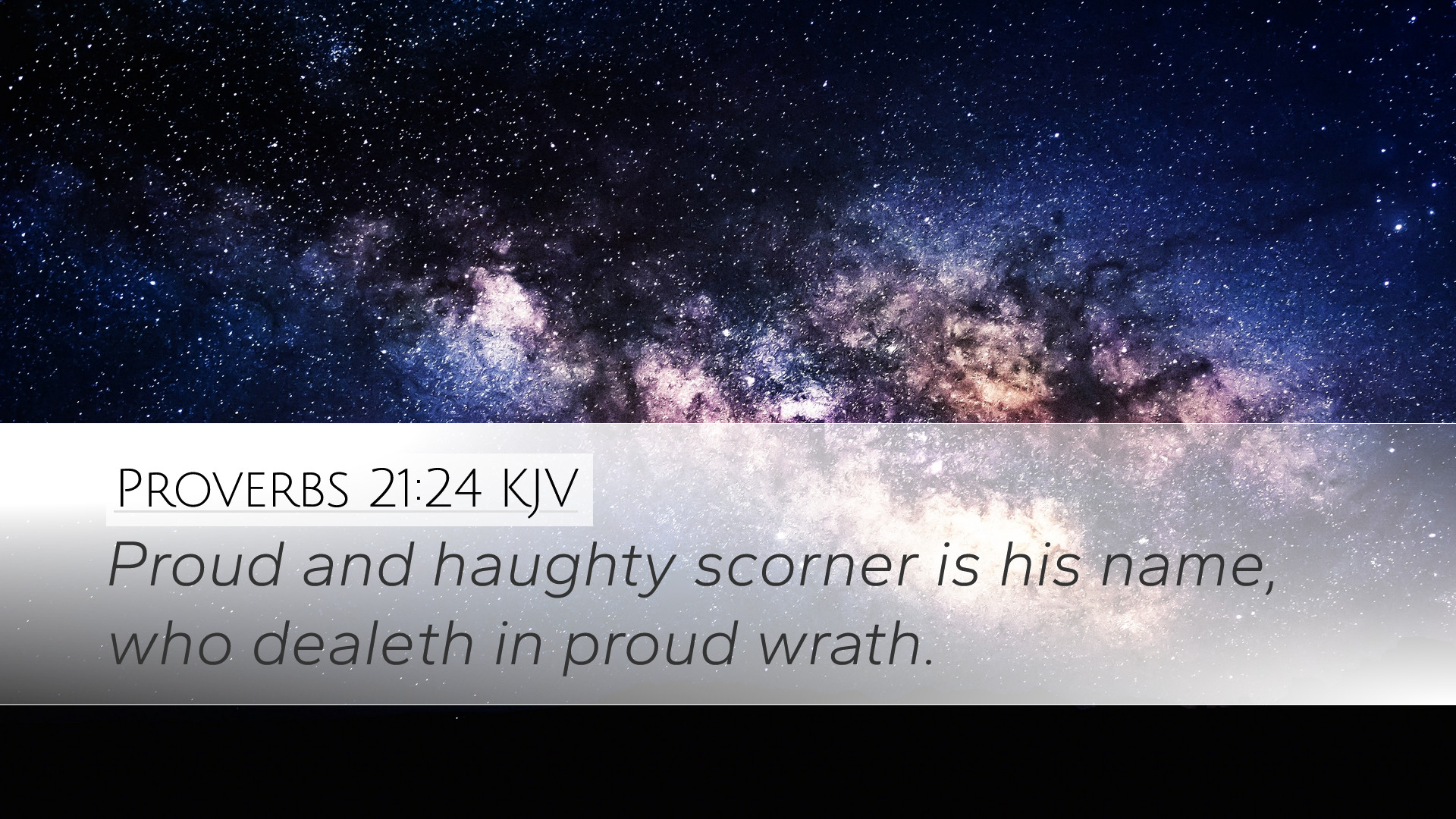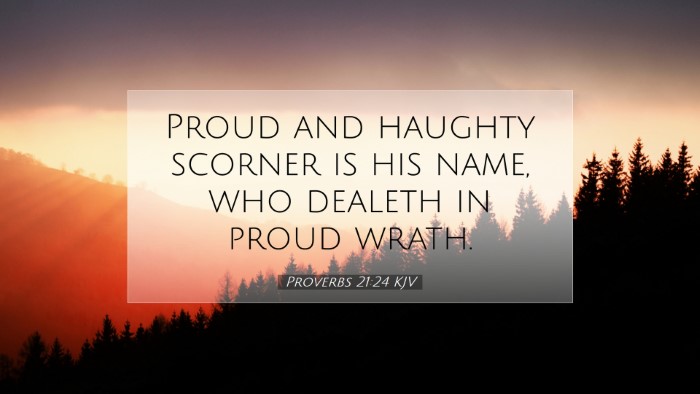Commentary on Proverbs 21:24
Verse: "Proud and haughty scorner is his name, who dealeth in proud wrath."
Introduction
The book of Proverbs offers profound insights into human behavior, governance, and moral life. In Proverbs 21:24, we encounter a verse that characterizes certain individuals by their pride and contempt. This commentary combines insights from public domain sources, including those by Matthew Henry, Albert Barnes, and Adam Clarke, to explore the implications of this verse for pastors, students, theologians, and Bible scholars.
Textual Analysis
The verse identifies the proud and haughty person, often described as a "scorner." Such a characterization serves as a cautionary note against attitudes that lead to destructive behaviors. The terms used present a clear moral evaluation of prideful dispositions.
Meaning of Key Terms
- Proud: This term signifies a sense of superiority that leads the person to consider themselves above others.
- Haughty: This indicates an overbearing attitude, often accompanied by disdain for those perceived as inferior.
- Scorner: This title reflects a contemptuous attitude, often mocking and deriding others, contributing to a culture of disdain.
- Wrath: This refers to an intense, often uncontrolled anger, showcasing how pride can lead to violent reactions.
The Nature of Pride
Pride is universally recognized in scripture as the precursor to many sins. Matthew Henry notes that "pride is a disease of the spirit," leading individuals to a self-exalted position that disregards others. This disposition not only corrupts one’s character but also distorts their relationships with others and with God.
Albert Barnes adds that the "scorner" does not merely harbor pride inwardly; they express it outwardly through disdainful behavior. Such individuals are often resistant to correction, which contributes to societal strife.
Comparative Wisdom in Proverbs
Proverbs consistently contrasts the behavior of the wise with the fool. Adam Clarke points out that a wise person recognizes their limitations and seeks knowledge, while the proud scorner rejects wisdom and embraces a life of conflict.
The imagery used in Proverbs not only serves to identify the character of the proud but also highlights the consequences of adopting such a mentality. It becomes apparent that the path of the scorner leads to ruin, illustrating the spiritual and social pitfalls associated with hubris.
Implications for Spiritual Leaders
For pastors and church leaders, Proverbs 21:24 serves both as a warning and as a guide for cultivating humility in their ministry. The haughty attitude condemned in this verse can infiltrate even the most devoted spiritual practices, leading to a disconnect with the congregational body.
Leaders are called to demonstrate compassion and humility, promoting an environment free from scorn and pride. This is crucial for fostering healthy church relationships and promoting a shared understanding of the Gospel message.
Application for Personal Reflection
For believers seeking to apply this verse, personal introspection is vital. The characteristic of the scorner may lurk within, leading to questions about one's own attitudes toward others. Reflecting on moments of pride and recognizing the impact on relationships can lead to spiritual growth and deeper community ties.
Encouraging a posture of humility and openness to correction can mitigate the destructive tendencies outlined in this verse. As Clarke suggests, those who desire to rise above their pride must also equip themselves with the wisdom that transcends mere knowledge.
The Broader Context of Proverbs
Proverbs 21:24 cannot be isolated from its broader textual context. The entirety of chapter 21 addresses various aspects of wisdom and moral conduct. It highlights the role of humility versus pride, reminding the reader that the ways of the righteous are rewarded while the scorner’s path leads to chaos.
In assessing the various themes of Proverbs, it becomes clear that the character evaluations presented serve to instruct the reader toward a wiser, more righteous life. Each verse builds toward a cumulative understanding of how one's character influences their lifestyle.
Conclusion
Proverbs 21:24 provides a stark warning about the nature of pride and the dangers inherent in being a scorner. By drawing from the wisdom of Matthew Henry, Albert Barnes, and Adam Clarke, we find a deeper understanding of this verse's implications for our spiritual lives and communities. As we strive to embody the wisdom of Proverbs, we must consciously resist the temptations of pride and cultivate a spirit of humility and love toward others.
Reflection Questions
- In what ways might pride be influencing my relationships with others?
- How can I actively cultivate a spirit of humility in my daily life?
- What steps can I take to support others in recognizing and overcoming pride?


